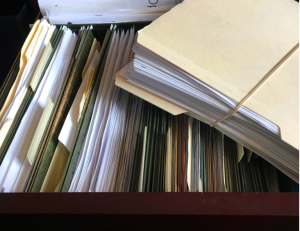 This is one of the most frequently asked questions from our clients. It sounds like there should be an easy answer, unfortunately it’s a little more complicated than you might think…
This is one of the most frequently asked questions from our clients. It sounds like there should be an easy answer, unfortunately it’s a little more complicated than you might think…
The general rule-of- thumb is to keep copies of tax returns indefinitely, and supporting documents for three years. That being said, there are a few exceptions.
Exceptions to the three-year rule …
- If you filed a claim for loss, in IRS terms “a casualty or theft loss deduction”, such as worthless securities or bad debt deduction: keep records for 7 years.
- If you are not reporting income that should be reported (ahem…now why would you do that?!?), and the amount is more than 25% of the gross income shown on your return: keep records for 6 years.
- Employment taxes: keep records for a minimum of 4 years after the date that the tax is due or paid.
- Health care information statements such as any employer-provider coverage, premiums paid, advance payments of the premium tax credit received and type of coverage: keep records for 3 years. (I realize this is not an exception to the 3-year rule, but stating the obvious is one of my strengths.)
- All property documents even after disposing of the property: keep records for up to 7 years.
How should I store my documents?
A shoe box, a bin, the classic filing drawer, or on a device… it’s your prerogative. (No judgement here.) However, when you store your documents – whether on paper or electronically – always, always keep them in a safe and secure place. I recommend scanning paper tax and financial records into a format that can be encrypted and stored securely.
The benefits of having a good system of storing your information is that it allows you to have easy access to the information. This is especially useful when you file the next year or when you apply for a home loan or financial aid. Also, if the IRS ever asks questions about a tax return or you need to file an amended return, you’ll be glad you stored records properly. (Because you don’t need your heart racing over missing documents!)
The most important document to have at your finger tips!
Last year’s tax return. Why? The IRS is making changes to authenticate and protect taxpayer identity. So beginning in 2017 some taxpayers who e-file will need to enter either the prior year Adjusted Gross Income or the prior year self-select PIN and date of birth.
What if I can’t find my tax return?
Don’t stress! The IRS allows you to request a free transcript for the past three tax years. (And you thought the IRS doesn’t pay back.) Here’s the link:
https://www.irs.gov/individuals/get-transcript
If you filed with us, simply login to our secure client portal to get your documents. EASY, we’ve got your back!
What should I do with my old documents?
Pop some champagne and have fun with this! But first a reality bite: Be mindful that identity thieves are always lurking and they find crafty ways of getting their hands on sensitive documents. So drink and destroy old documents responsibly!
While you choose the bottle of champagne, let us recommend how to dispose of your old documents:
- Paper documents – SHRED THEM
- If you’re getting rid of an old computer – REMOVE THE HARD DRIVE and PHYSICALLY DESTROY IT
- To remove information from a tablet, a mobile phone, or a back up drive – YOU MAY REQUIRE SPECIAL DISK UTILITY SOFTWARE.
The purpose of this article is to provide information, rather than advice or opinion. It is accurate to the best of the authors’ knowledge as of the date of the article. Accordingly, this article should not be viewed as a substitute for the guidance and recommendations of a retained professional.

